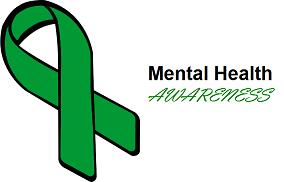 On April 30, 2013, President Obama proclaimed May, “National Mental Health Awareness Month.” As the press release from the Office of the Press Secretary stated, “…tens of millions of Americans are living with the burden of a mental health problem. They shoulder conditions like depression and anxiety, post-traumatic stress and bipolar disorder — debilitating illnesses that can strain every part of a person’s life. And even though help is out there, less than half of children and adults with diagnosable mental health problems receive treatment.”
On April 30, 2013, President Obama proclaimed May, “National Mental Health Awareness Month.” As the press release from the Office of the Press Secretary stated, “…tens of millions of Americans are living with the burden of a mental health problem. They shoulder conditions like depression and anxiety, post-traumatic stress and bipolar disorder — debilitating illnesses that can strain every part of a person’s life. And even though help is out there, less than half of children and adults with diagnosable mental health problems receive treatment.”
This is something that we at Capital EAP know all too well. We have responded by developing an entirely new approach to Employee Assistance; launching our Care Counseling team to provide you with both telephone and web-based support; providing more information about EAP Services and benefits, and most of all, spreading the word that seeking assistance for the mental and emotional stresses of the day is okay.
Mental health, much like physical health, is not all or nothing; sick or well. Like physical illnesses, there are varying degrees of severity and impact. An individual suffering through the stress of marital conflict may not be incapacitated, but they are often distracted enough where routine daily activities like readying children for school, or performing optimally at work, are difficult.
According to estimates published by the National Association on Mental Illness, roughly 5.8% of the population in the US lives with serious mental illness. That being where a diagnosis can involve psychosis (losing touch with reality or experiencing delusions) or high levels of care which may require hospital treatment such as schizophrenia, major depression, severe anxiety, or bipolar disorder.
This is a tremendously high number, but it pales next to the percentage in a given year that suffers from less severe mental and emotional disorder. According to the National Institute of Health (NIH), an estimated 26.2 % of Americans ages 18 and older, or about one in four adults, suffer from a diagnosable mental disorder in any given year.
Remarkably, as reported by Mental Health America, More than 90 percent of employees agree that their mental health and personal problems spill over into their professional lives, and have a direct impact on their job performance. This means 9 out of 10 working Americans struggle enough with emotional and mental issues that it may affect their work, productivity, safety and almost certainly their happiness. It stands to reason that these same issues are affecting the quality and happiness of their lives at home as well.
Many of the pressures that affect our mental well-being are successfully managed in time. With the support of family, friends, and often colleagues, most of the challenges we experience day-to-day pass. But for many, the passing is slow. For some, the problems become more severe and unmanageable. When this happens, if left untreated, mental health problems can ruin lives, families, and careers.
President Obama’s declaration was to highlight the severity of a problem not only of numbers, but of awareness. Despite the magnitude and reach of mental health problems, most of those in need never seek help out of fear of stigma, embarrassment, appearing “weak,” or legitimate concerns over the impact that discovery may have at home or in the workplace. This prejudges results in untreated and unsupported individuals that continue trying to “tough it out,” but with no means, training, or effective strategies to achieve success.
As Michael J. Fitzpatrick, Executive Director of the National Alliance on Mental Illness put it, “Simply stated, treatment works, if you can get it.” As a Member of Capital EAP, you have free and confidential access to treatment and support for emotional issues and mental health. That support can help you and your family members to more quickly gain control of the challenges that affect your happiness and well-being.
During this first Mental Health Awareness Month, take some time to learn more about Mental Illness. If you have more questions, you can also call Capital EAP and speak to one of our counselors.
